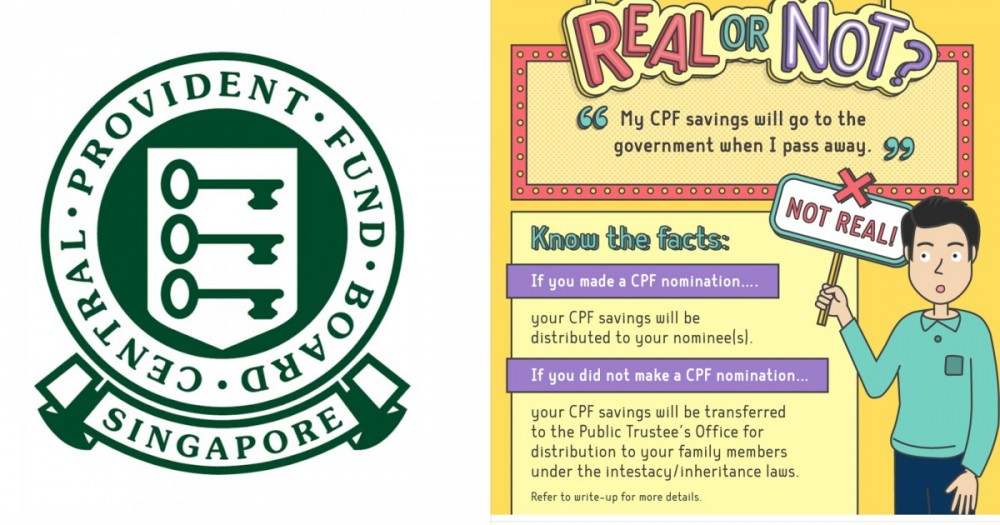Search the Community
Showing results for tags 'cpf'.
-
https://www.businesstimes.com.sg/banking-finance/ocbc-offers-fixed-deposit-placements-for-cpf-ordinary-account-savings-at-34-a-year Why liang po po said cpf 2.5% best rate huh 🙉🙊🙈
-
Parked some in unit trusts ard 3 years back but find the returns quite CMI - average onli ard 3%. Juz curious if any bros got good tips on what to invest in wif ur surplus SRS funds?
- 141 replies
-
- 1
-

-
- investment
- invest
- (and 4 more)
-
Been happening for some time but this is a very good case where both cannot meet minimum sum https://singaporeuncensored.com/couple-divorce-so-they-can-buy-another-hdb-flat-to-earn-rental/ COUPLE DIVORCE SO THEY CAN BUY ANOTHER HDB FLAT TO EARN RENTAL ByHello Its me September 8,...
- 67 replies
-
- 9
-

-

-

-
.png)
-
- divorce
- retirement
- (and 15 more)
-
https://tnp.straitstimes.com/news/singapore/man-71-jailed-cheating-cpf-board-giving-him-income-over-10-years Man, 71, jailed for cheating CPF Board into giving him income for over 10 years For over a decade, the elderly man duped the Central Provident Fund (CPF) Board into thinking that he...
- 10 replies
-
- 1
-

-
https://www.channelnewsasia.com/news/asia/malaysia-epf-withdrawal-anwar-najib-relieved-prudent-13602184 I read this news with great interest.. We have some Singaporeans clamouring for their early withdrawal of the SG equivalent: CPF. Now that a neighbouring country which literally too...
-
The best way for Singaporeans to prepare for retirement is to use less of their Central Provident Fund (CPF) money when they are young. Minister in the Prime Minister's Office Lim Swee Say said this will ensure the current level of CPF payout can be maintained over time, and not be eroded by inf...
- 1,002 replies
-
- 4
-

-

-
- cpf
- retirement
-
(and 3 more)
Tagged with:
-
CPF’s Retirement Sum Scheme payout period to be capped at age 90 from 2020 Read more at https://www.todayonline.com/singapore/cpfs-retirement-sum-scheme-payout-period-be-capped-age-90-2020-josephine-teo SINGAPORE — The payout rules for the Retirement Sum Scheme under the Central Providen...
- 53 replies
-
- 3
-
.png)
-

-
- josephine teo
- cpf
-
(and 1 more)
Tagged with:
-
https://www.channelnewsasia.com/news/singapore/hdb-flats-housing-grant-income-ceilings-higher-11891818 Bto income ceiling increased to 14k. EC up to 16k. Increased grants depending on income levels. 👍
-
Members of the public are advised to make nominations for their central provident fund (CPF) monies as early as possible, after CPF monies left unclaimed with the Insolvency and Public Trustee’s Office over the last six years reached a total of S$211 million. The Straits Times reported that the...
-
i saw jobs posting, $1700 for f&b service crew this include $1700 + 17% employer cpf? or gross $1400 + 17% employer cpf = $1700 gross?
-
I wonder how many of us here are clear about how the CPF Life balance sum is computed before returning to the beneficiaries upon demise of the account holder ? Here is my understanding. Assuming a person Mr. A has $170k in his RA at age 55. by the time he reaches 65, his RA account sh...
-
Is the HDB housing loan a reducing balance loan? If so, how is the monthly instalment amount calculated? I understand that if the monthly instalment is X, then X = Y+Z where Y goes toward principal and Z toward interest. Over time, X remains constant but Y and Z will change. How is X det...
-
This was brought up a few days ago, in the "President" 's policy suggestions... Instead of stopping people using their CPF to pay for their mortgages, why not reduce the prices if HDB flats and not peg them to market prices with land prices? Then Singaporeans will have more money to save with lower...
-
https://mothership.sg/2018/05/married-couple-divorced-buy-hdb-flat-as-single/?nlarticleid=11561273 Husband and wife agree to a divorce of convenience A husband and wife in Singapore had apparently agreed to divorce — just so that they can each own a HDB flat. This was after they figured...
-
just now i was in Toa Payoh central when i was waylaid by an AIA agent having their road show. to cut to the chase, he told me that from middle of Sep 18, we cannot use the CPF SA to invest anymore ... is this true ?
- 59 replies
-
- cpf
- special account
-
(and 3 more)
Tagged with:
-
Hi all, Just wondering whats the best thing to do or rather what are my options if i have access in OA account and still servicing a HDB bank loan. Theres about enough to pay 24months of installments in my OA(cos my house is dirt cheap so installment is pretty low) Is there any way i can make...
-
Blardee selfish a**holes with selfish agenda. I feel for the kids who practiced hard for today's YMVA event. http://www.straitstimes.com/news/singapore/more-singapore-stories/story/special-needs-children-heckled-hong-lim-park-rallygoers-#xtor=CS1-10 A protest rally on Saturday turned chaotic...
- 2,440 replies
-
- 23
-

-
- roy nerng
- han hui hui
-
(and 3 more)
Tagged with:
-
Many CPF investors get their fingers burnt MOST investors who use Central Provident Fund (CPF) savings to invest would have been better off leaving their money in their Ordinary Accounts, according to the CPF Investment Scheme's (CPFIS) annual profit and loss report. This is despite the go...
- 71 replies
-
- 1
-

-
- cpf
- make money
-
(and 5 more)
Tagged with:
-
i hope somebody can share his experience with me on this. i wanted to enrol my son to NAFA school for his diploma next year. I know we can use our ordinary acct for our child's education loan. but my ordinary acct is drained and my monthly contribution goes to my housing loan. next chance is my...
-
http://www.channelnewsasia.com/news/singapore/re-employment-age-raised/2678966.html Dear bros, Do you think that the government will raise the age that you can start withdrawing from the CPF Retirement Account from the current 65 to 67 in 2017?
- 241 replies
-
- 4
-

-
- cpf
- retirement age
-
(and 4 more)
Tagged with:
-
Huat ah ! http://www.straitstimes.com/news/business/economy/story/cpf-minimum-sum-be-raised-155000-july-1-20140508 Actually, every year should increase by $100,000 so no one can ever touch it. It's reserved for temasick to gamble with.
- 1,560 replies
-
- 1
-

-
- cpf minimum sum
- cpf funds
-
(and 5 more)
Tagged with:
-
The CPF salary ceiling, the maximum amount of ordinary wages that employee and employer contributions are calculated on, was raised from $5,000 to $6,000. "Middle-income Singaporeans will be able to accumulate more CPF savings during their working years," Deputy Prime Minister Tharman Shanmugara...
- 275 replies
-
- 15
-

-
saw this recent, dated May 2015, letter from CPF with regards to grand-dad passing (which was more than 2 decades ago).. it mentioned that it was just notified that xxx had passed and yyy as related is entitled to some funds and needs to fill up the attached form. (something like that as i only...
- 31 replies
-
- cpf
- cpf nomination
-
(and 1 more)
Tagged with:
-
i was appalled when i saw this. This is just morally wrong. And they just wanted the money to pay for funeral expenses. This is like stealing from the dead. CPF, have you no moral sense of decency? Trusts, estates, probate & wills Sisters give up bid for grandma's CPF money S...























